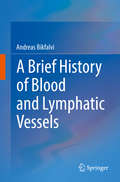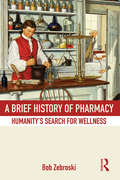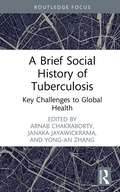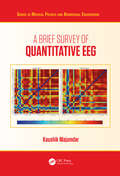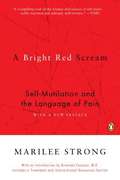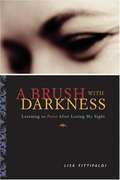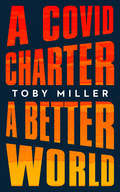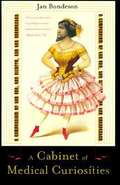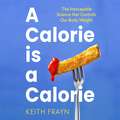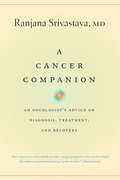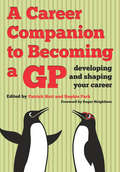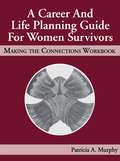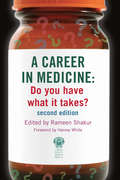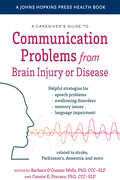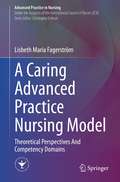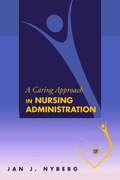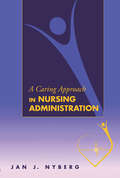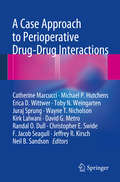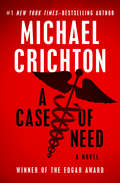- Table View
- List View
A Brief History of Blood and Lymphatic Vessels
by Andreas BikfalviThis book provides a comprehensive account of vascular biology and pathology and its significance for health and disease. It systematically and chronologically explains how we came to our current understanding of the vasculature and it´s function today, and describes in an entertaining way the diverse flaws and turns in science and medicine from the past. It thereby offers a complete and well-studied history on vascular biology and medicine. The book has an easy-to-read style and is written for students as well as scientists, physicians and lecturers in the field of biomedicine, human physiology, cardiology and hematology.
A Brief History of Florence Nightingale: and Her Real Legacy, a Revolution in Public Health (Brief Histories)
by Mr Hugh SmallPraise for Small's earlier work on Nightingale: 'Hugh Small, in a masterly piece of historical detective work, convincingly demonstrates what all previous historians and biographers have missed . . . This is a compelling psychological portrait of a very eminent (and complex) Victorian.' James Le Fanu, Daily TelegraphFlorence Nightingale (1820-1910) is best known as a reformer of hospital nursing during and after the Crimean War, but many feel that her nursing reputation has been overstated. A Brief History of Florence Nightingale tells the story of the sanitary disaster in her wartime hospital and why the government covered it up against her wishes. After the war she worked to put the lessons of the tragedy to good use to reduce the very high mortality from epidemic disease in the civilian population at home. She did this by persuading Parliament in 1872 to pass laws which required landlords to improve sanitation in working-class homes, and to give local authorities rather than central government the power to enforce the laws. Life expectancy increased dramatically as a result, and it was this peacetime civilian public health reform rather than her wartime hospital nursing record that established Nightingale's reputation in her lifetime. After her death the wartime image became popular again as a means of recruiting hospital nurses and her other achievements were almost forgotten. Today, with nursing's new emphasis on 'primary' care and prevention outside hospitals, Nightingale's focus on public health achievements makes her an increasingly relevant figure.
A Brief History of Pharmacy: Humanity's Search for Wellness
by Bob ZebroskiPharmacy has become an integral part of our lives. Nearly half of all 300 million Americans take at least one prescription drug daily, accounting for $250 billion per year in sales in the US alone. And this number doesn't even include the over-the-counter medications or health aids that are taken. How did this practice become such an essential part of our lives and our health? A Brief History of Pharmacy: Humanity's Search for Wellness aims to answer that question. As this short overview of the practice shows, the search for well-being through the ingestion or application of natural products and artificially derived compounds is as old as humanity itself. From the Mesopotamians to the corner drug store, Bob Zebroski describes how treatments were sought, highlights some of the main victories of each time period, and shows how we came to be people who rely on drugs to feel better, to live longer, and look younger. This accessible survey of pharmaceutical history is essential reading for all students of pharmacy.
A Brief Social History of Tuberculosis: Key Challenges to Global Health
by Arnab Chakraborty Janaka Jayawickrama Yong-An ZhangA Brief Social History of Tuberculosis delves into the history of tuberculosis and its impact on human populations.Drawing on research and expert experiences, the three research chapters (3–5) will explore how the disease has affected communities throughout history, and how society has responded to the threat of tuberculosis over time. Tuberculosis has been a persistent and devastating force from the crowded cities of the Industrial Revolution to the present day. However, this book will argue that there is much to be learned from the successes and failures of past efforts to control the disease from a social perspective. By examining the history of tuberculosis, researchers and policymakers can gain valuable insights into the challenges of infectious disease control, as well as the social and political factors that shape our response to such challenges.This volume will focus on generating critical discussions among scholars, researchers, and policymakers: it will be informative, engaging, and an essential read for anyone interested in the history of medicine, public health, and the ongoing struggle against infectious diseases worldwide.
A Brief Survey of Quantitative EEG (Series in Medical Physics and Biomedical Engineering)
by Kaushik MajumdarThis book presents a holistic approach to quantitative EEG from its neurological basis to simultaneous EEG and fMRI studies. Equal emphasis is given to major mathematical and statistical theories and computational techniques and their applications on clinical and laboratory experimental EEG.
A Bright Red Scream: Self-mutilation and the Language of Pain
by Marilee StrongSelf-mutilation is a behaviour so shocking that it is almost never discussed. Yet millions of people all over the world are chronic self-injurers. They are people who use knives, razor blades, or broken glass to cut themselves and their numbers include Johnny Depp and the late Princess Diana. In this groundbreaking work - an essential resource for victims, parents and therapists - Strong explores this hidden epidemic through case studies, research from psychologists, trauma experts, and the cutters themselves. It is a compelling tour of the trauma and science of self-injury.
A Brush With Darkness: Learning to Paint After Losing My Sight
by Lisa FittipaldiWhen Lisa Fittipaldi went blind at the age of forty-seven, she descended into a freefall of anger and denial that lasted for two years. In this moving memoir, she paints a vivid picture of the perceptual and emotional darkness that accompanied her vision loss, and her arduous journey back into the sighted world through mastery of the principles of art and color.
A Brush with Love: As seen on TikTok! The sparkling new rom-com sensation you won't want to miss!
by Mazey EddingsThe new TikTok-hit rom-com! Adored The Love Hypothesis? You won't want to miss A Brush with Love, the most sparkling rom-com of the year!Anxiously awaiting news from the residency program of her dreams, dental student Harper Horowitz is laser focused. So crashing (quite literally) into Dan Craige is exactly the sort of dreamy distraction that she is trying to avoid.First-year student Dan may not have the same passion for pulling teeth that Harper does, but he's instantly smitten. When Harper makes it clear that she's not interested in trading fillings for feelings anytime soon, they set out to be 'just friends' - a plan with the best of intentions and the poorest of follow-throughs.Late nights in the dental lab (and the rather unsubtle match-making efforts of their friends), draw Dan and Harper closer. Still, Harper can't shake the worry that a romance with Dan might risk everything she's worked so hard to build.Harper may have no trouble acing her studies, but falling in love is a whole new challenge.Nine out of ten dentists agree, A Brush with Love makes your smile brighter!**not scientifically proven..............................................................................'Blends sweetness, breathless romance, and moments of striking vulnerability' HELEN HOANG'Prepare to smile, laugh, and cry your way through this witty, fast-paced rom-com starring a passionate heroine and a delicious cinnamon roll hero who knows how to love her just right' EVIE DUNMORE'Mazey Eddings stole my heart with this laugh-out-loud funny, almost unbearably cute debut (and she made me care about dentistry)' ROSIE DANAN'I'm obsessed with this book, and I fully intend to never stop yelling about it. With a shimmering voice and razor-sharp wit, Mazey Eddings has crafted a contemporary romance masterpiece that made me want to hug my dentist . . . The most intoxicating slow burn I've read in ages' RACHEL LYNN SOLOMON'Harper and Dan have my whole heart . . . A Brush with Love is funny and cute while also exploring serious topics, powerfully underscoring the truth that relationships require work, and that happy endings are for everyone' SARAH HOGLE'Tenderly written and oh-so-sexy, A Brush with Love brims with emotional depth, whip-smart banter, and sizzling chemistry' CHLOE LIESEMazey Eddings returns later this year with another unique and swoony rom-com, Lizzie Blake's Best Mistake!(P) 2022 Macmillan Audio
A Brush with Love: TikTok made me buy it! The sparkling new rom-com sensation you won't want to miss!
by Mazey EddingsThe new TikTok-hit rom-com! Adored The Love Hypothesis? You won't want to miss A Brush with Love, the most sparkling rom-com of the year!Readers are giving A Brush with Love FIVE SHINING STARS! ⭐ ⭐ ⭐ ⭐ ⭐'A Brush with Love is going to be a TOP romance of 2022. Calling it. In January''Oh my TOOTH FAIRY!! This book was so much more than I expected and swept me off my feet' 'Swoony, steamy, adorable . . . Read. This. Book. You won't be disappointed. It's a keeper and Mazey Eddings is on my auto-read list forever''There was so much to love about this book . . . Thank you to Mazey Eddings for this romance with its messy, true, and painfully real representation of anxiety . . . We need more books like this in the world'..............................................................................Anxiously awaiting news from the residency program of her dreams, dental student Harper Horowitz is laser focused. So crashing (quite literally) into Dan Craige is exactly the sort of dreamy distraction that she is trying to avoid.First-year student Dan may not have the same passion for pulling teeth that Harper does, but he's instantly smitten. When Harper makes it clear that she's not interested in trading fillings for feelings anytime soon, they set out to be 'just friends' - a plan with the best of intentions and the poorest of follow-throughs.Late nights in the dental lab (and the rather unsubtle match-making efforts of their friends), draw Dan and Harper closer. Still, Harper can't shake the worry that a romance with Dan might risk everything she's worked so hard to build.Harper may have no trouble acing her studies, but falling in love is a whole new challenge.Nine out of ten dentists agree, A Brush with Love makes your smile brighter!**not scientifically proven..............................................................................'Blends sweetness, breathless romance, and moments of striking vulnerability' HELEN HOANG'Prepare to smile, laugh, and cry your way through this witty, fast-paced rom-com starring a passionate heroine and a delicious cinnamon roll hero who knows how to love her just right' EVIE DUNMORE'Mazey Eddings stole my heart with this laugh-out-loud funny, almost unbearably cute debut (and she made me care about dentistry)' ROSIE DANAN'I'm obsessed with this book, and I fully intend to never stop yelling about it. With a shimmering voice and razor-sharp wit, Mazey Eddings has crafted a contemporary romance masterpiece that made me want to hug my dentist . . . The most intoxicating slow burn I've read in ages' RACHEL LYNN SOLOMON'Harper and Dan have my whole heart . . . A Brush with Love is funny and cute while also exploring serious topics, powerfully underscoring the truth that relationships require work, and that happy endings are for everyone' SARAH HOGLE'Tenderly written and oh-so-sexy, A Brush with Love brims with emotional depth, whip-smart banter, and sizzling chemistry' CHLOE LIESEMazey Eddings returns later this year with another unique and swoony rom-com, Lizzie Blake's Best Mistake!
A Burst of Light
by Audre LordeIn 1984, feminist poet Lorde learned that her breast cancer had metastasized to the liver. The moving title section comprises a series of journal excerpts that both frighten and inspire: choosing not to have a biopsy, she instead treats the disease with a stay at the homeopathic Lukas Klinik in Switzerland, consultations with more traditional medical specialists and alternatives like self-hypnosis. Her lifelong battle against racism, sexism and homophobia has armed her with the resilience to resist cancer, and thus "A Burst of Light" becomes not only a chronicle of Lorde's fight against disease, but a view of one woman's sparring with injustice, whether the oppressors are the South African police, the American government or malignant cells within her own body. Although it rings out with passion, anger and hope, the lengthy title piece is sometimes rambling and repetitive. In refreshing contrast, three outstanding essays on black lesbianism, the parallels between South Africa and the United States, and lesbian parenting are politically specific and pithy. -Publishers Weekly
A COVID Charter, A Better World
by Toby MillerWith unprecedented speed, scientists have raced to develop vaccines to bring the COVID-19 pandemic under control and restore a sense of normalcy to our lives. Despite the havoc and disruption the pandemic has caused, it’s exposed exactly why we should not return to life as we once knew it. Our current profit-driven healthcare systems have exacerbated global inequality and endangered public health, and we must take this opportunity to construct a new social order that understands public health as a basic human right. A COVID Charter, A Better World outlines the steps needed to reform public policies and fix the structural vulnerabilities that the current pandemic has made so painfully clear. Leading scholar Toby Miller argues that we must resist neoliberalism’s tendency to view health in terms of individual choices and market-driven solutions, because that fails to preserve human rights. He addresses the imbalance of geopolitical power to explain how we arrived at this point and shows that the pandemic is more than just a virus—it’s a social disease. By examining how the U.S., Britain, Mexico, and Colombia have responded to the COVID-19 crisis, Miller investigates corporate, scientific, and governmental decision-making and the effects those decisions have had on disadvantaged local communities. Drawing from human rights charters ratified by various international organizations, he then proposes a COVID charter, calling for a new world that places human lives above corporate profits.
A Cabinet of Medical Curiosities
by Jan BondesonIn this book of amazing oddities, Jan Bondeson explores unexpected, gruesome, and bizarre aspects of the history of medicine. He regales us with stories of spontaneous human combustion; vicious tribes of tailed men; the Two-Headed Boy of Bengal; Mary Toft, who allegedly gave birth to seventeen rabbits; and Julia Pastrana, exhibited around the world as the Ape Woman. Bondeson combines an historian's skill in showing us our timeless fascination with the grotesque with a physician's diagnostic abilities, as he examines the evidence and provides likely explanations for these peculiar events. "Fascinating. . . . Well-researched and extensively illustrated with items from [Bondeson's] personal collection, it covers a wide range of medical monstrosities, and there is something for everyone. " â " The Lancet "Entertaining in the simultaneously creepy and amusing way of a carnival sideshow. . . . Bondeson is quick to acknowledge absurdity, and his wry humor, along with his strong personal judgments, spice up the book. " â " Publishers Weekly "Bondeson . . . regards his exhibits with a careful scientist's eye, discovering misinterpreted evidence, tragic genetic mutations, and, occasionally, outright fraud. " â " Library Journal
A Calorie is a Calorie: The Inescapable Science that Controls Our Body Weight
by Keith FraynWe all know someone who seems to eat very little yet cannot avoid weight gain, or someone who eats everything they like while remaining slim. Why? Is it the kinds of food we eat, and when? Are our hormones to blame? Could it be chemicals in our environment? Even specialists are now questioning our understanding of the forces that shape body weight, and we are all more confused than ever.In this book, Keith Frayn, one of the world's leading experts on metabolism, argues that all these challenges are distracting us from tackling the obesity problem in the only way it can be addressed: by rebalancing the disregarded message of 'calories in - calories out'.Taking readers on a deep dive into the real science of energy balance, he reveals how nutrition research has been plagued by the difficulty of really knowing what people are eating and doing; why it is unlikely that some nutrients are intrinsically more fattening than others; how supposed differences between people in the speed of their metabolism vanish in the laboratory; how energy balance is altered in obese people and people who have managed to lose weight; and why these responses - honed over millennia of evolution - make dieting so hard. With clarity and insights from expert research, Frayn provides a clear-eyed perspective on current trends mired in controversy and confusion: time-restricted eating, intermittent fasting, low-carb versus low-fat meal plans, high-protein breakfasts and other dietary trickery. In a world where desirable, energy-rich food is increasingly plentiful, and labour-saving gadgets widespread, it becomes more and more difficult to stick to the simple message of energy balance. But, as Frayn shows, we can reshape our lives and improve our health by going back to what we know about calories, rediscovering the benefits of a more active life, and getting smart about what we eat.
A Calorie is a Calorie: The Inescapable Science that Controls Our Body Weight
by Keith FraynWe all know someone who seems to eat very little yet cannot avoid weight gain, or someone who eats everything they like while remaining slim. Why? Is it the kinds of food we eat, and when? Are our hormones to blame? Could it be chemicals in our environment? Even specialists are now questioning our understanding of the forces that shape body weight, and we are all more confused than ever.In this book, Keith Frayn, one of the world's leading experts on metabolism, argues that all these challenges are distracting us from tackling the obesity problem in the only way it can be addressed: by rebalancing the disregarded message of 'calories in - calories out'.Taking readers on a deep dive into the real science of energy balance, he reveals how nutrition research has been plagued by the difficulty of really knowing what people are eating and doing; why it is unlikely that some nutrients are intrinsically more fattening than others; how supposed differences between people in the speed of their metabolism vanish in the laboratory; how energy balance is altered in obese people and people who have managed to lose weight; and why these responses - honed over millennia of evolution - make dieting so hard. With clarity and insights from expert research, Frayn provides a clear-eyed perspective on current trends mired in controversy and confusion: time-restricted eating, intermittent fasting, low-carb versus low-fat meal plans, high-protein breakfasts and other dietary trickery. In a world where desirable, energy-rich food is increasingly plentiful, and labour-saving gadgets widespread, it becomes more and more difficult to stick to the simple message of energy balance. But, as Frayn shows, we can reshape our lives and improve our health by going back to what we know about calories, rediscovering the benefits of a more active life, and getting smart about what we eat.
A Cancer Companion: An Oncologist's Advice on Diagnosis, Treatment, and Recovery
by Dr Ranjana SrivastavaCancer. It's the diagnosis no one wants to hear. Unfortunately though, these days most of us have known or will know someone who receives it. But what's next? With the diagnosis comes not only fear and uncertainty, but numerous questions, as well as, often, a lot of unsolicited advice. With "A Cancer Companion," esteemed oncologist Ranjana Srivastava is here to help, bringing both experience and honesty to guide cancer patients and their families through this labyrinth of questions and treatments. With candor and compassion, Srivastava provides an approachable and authoritative reference. She begins with the big questions, like what cancer actually is, and she moves on to offer very practical advice on how to find an oncologist, what to expect during and after treatments, and how to manage pain, diet, and exercise. She discusses in detail the different therapies for cancers and why some cancers are inoperable, and she skillfully addresses the emotional toll of the disease. She speaks clearly and directly to cancer patients, caretakers, and their loved ones, offering straightforward information and insight, something that many oncologists can't always convey in the office. Equipping readers with the knowledge to make informed decisions at every step of the way, "A Cancer Companion" is an indispensable guide by a physician who cares to educate patients as much as she does to treat them.
A Career Companion to Becoming a GP: Developing and Shaping Your Career
by Patrick Hutt Sophie Park'How many general practitioners ended up in their roles thanks to a faint breeze nudging them in a given direction? How many successes resulted from failure? Some of the most successful practices were built up from nothing, and some of the happiest doctors spent time not being doctors. Despite the element that fate plays in career paths it is prudent to make plans - ' A career in general practice offers many options for further professional development. While some GPs prefer to concentrate primarily on their practice, others find additional fulfillment in teaching, research or international collaboration. Whichever path you choose, general practice promises a rewarding and exciting experience. This inspiring new book emphasises there is no single career path in general practice. Without being prescriptive, its practical approach helps you make life-changing decisions, prompts self-analysis and equips you with the tools to remain flexible, positive and reflective about your career. 'So - have you got what it takes to practise the 'medicine plus' which is today's general practice? This book, written and edited by colleagues many of whom have far more street cred than I, will help you decide. If you have, I wish you luck, fulfilment, and the gratification that comes from being a catalyst for good in the lives of your fellow human beings. If you have a role teaching and mentoring the next generation of GPs, you will find this book a persuasive ally. But if you decide that hospital medicine is your preferred option - well, that's fine. There would be no shame, if you find the ladder to general practice too steep, in settling for becoming a brain surgeon.' Roger Neighbour, in the Foreword 'Lively, extremely informative and engaging' Professor Roger Jones, Editor, British Journal of General Practice
A Career and Life Planning Guide for Women Survivors: MAKING THE CONNECTIONS WORKBOOK
by Patricia MurphyThis book aims to assist women survivors of abuse in creating and directing their own vocational plans whether or not these efforts take place in state departments of rehabilitation and work and welfare programs such as the JOBS program arising out of the Family Services Act.
A Career in Medicine: Do you have what it takes? second edition
by Rameen ShakurHave you ever thought about becoming a doctor but weren't sure where to start or what to expect? This book provides a comprehensive resource to guide you through the various stages involved in becoming a doctor, from deciding whether medicine is right for you, to choosing and applying to medical school, interview skills, student finance, plus what
A Caregiver's Guide to Communication Problems from Brain Injury or Disease (A Johns Hopkins Press Health Book)
by Barbara O’Connor Wells, PhD, CCC-SLP and Connie K. Porcaro, PhD, CCC-SLPAn all-in-one guide for helping caregivers of individuals with brain injury or degenerative disease to address speech, language, voice, memory, and swallowing impairment and to distinguish these problem areas from healthy aging.Advances in science mean that people are more likely to survive a stroke or live for many years after being diagnosed with a degenerative disease such as Parkinson's. But the communication deficits that often accompany a brain injury or chronic neurologic condition—including problems with speech, language, voice, memory, and/or swallowing—can severely impact quality of life.If you are a caregiver coping with these challenges, this all-in-one book can help you and your loved one. Written by a team of experts in speech-language pathology, each chapter focuses on a different aspect of caregiving and features relatable patient examples. Providing answers to common questions, definitions of complex medical terms, and lists of helpful resources, this book also:• touches on expected, age-related changes in communication, memory, swallowing, and hearing abilities, to name a few• offers practical strategies for caregivers to cope with speech, language, and voice problems and to maximize their loved one's ability to communicate• reveals how caregivers can assist their loved ones with swallowing challenges to maintain good nutrition and hydration • provides crucial information on how caregivers can handle grief and take care of themselves during the caregiving process• explains how to incorporate the arts, as well as a loved one's hobbies and interests, into their communication or memory recoveryThis comprehensive book will allow readers to take a more informed and active role in their loved one's care.Contributors: Marissa Barrera, Frederick DiCarlo, Lea Kaploun, Elizabeth Roberts, Teresa Signorelli Pisano
A Caring Advanced Practice Nursing Model: Theoretical Perspectives And Competency Domains (Advanced Practice in Nursing)
by Lisbeth Maria FagerströmThis book introduces readers to the basics of Advanced Practice Nursing (APN), which offers expanded clinical competence that can help improve the quality of health and care services. The book offers a range of perspectives on APN, APN models, APN education, challenges in the implementation of APN in new countries, as well as a description of the APN role, including areas of expertise. These core areas of the Caring APN model (clinical nursing practice; ethical decision-making; coaching and teaching; consultation; collaboration; case management; leadership; research and development) are described, together with the role of APN in acute care and primary healthcare service contexts. The book also explores the connection between epistemology, a three-dimensional view of knowledge (epistêmê, technê and phronesis) and a caritative perspective, as well as central theoretical aspects of nursing, e.g. health, holism and ethics/ethos. All research should be grounded in theoretical perspectives, and here we highlight the value of a caring and person-centered philosophy in advanced practice nursing. Through its specific focus on the central, generic theoretical features of nursing science that deepen the role of APN and the scope of practice and APN research and education, the content presented here will help any researcher, teacher or student understand the importance of epistemological issues for research, education and clinical practice in this field. Moreover, it can be used when designing Master’s programs in Advanced Practice Nursing, making the book a valuable resource for the international nursing community.
A Caring Approach in Nursing Administration
by Jan J. NybergCurrent mainstream books and publicity about management and administration in health care are concerned with the takeover of health care by managed-care organizations. Many provide lots of quick and externally focused answers. Many of them are economically driven, to the exclusion of humans, values, ethics, and the human spirit of all those who pass through systems as deliverers and receivers of care. On the other hand, there is a new generation of works that address new forms of administration and leadership-works that inspire and evoke foundational changes in health care and forms of organizational leadership and management. This work by Dr. Jan Nyberg is guided by a lifelong career of administration and management that is informed by deeper human dimensions of caring, and more lasting approaches to change than quick-fix, economic takeovers.
A Caring Approach in Nursing Administration
by Jan J. NybergCurrent mainstream books and publicity about management and administration in health care are concerned with the takeover of health care by managed-care organizations. Many provide lots of quick and externally focused answers. Many of them are economically driven, to the exclusion of humans, values, ethics, and the human spirit of all those who pass through systems as deliverers and receivers of care. On the other hand, there is a new generation of works that address new forms of administration and leadership-works that inspire and evoke foundational changes in health care and forms of organizational leadership and management. This work by Dr. Jan Nyberg is guided by a lifelong career of administration and management that is informed by deeper human dimensions of caring, and more lasting approaches to change than quick-fix, economic takeovers. Jan Nyberg, an experienced nursing administrator, scholar, and educator, knows another way-from the inside out rather than the outside in. She brings forth her wisdom and knowledge, experiences, and insights so that others may now grasp another way to transform systems for delivery of human caring and healing. This work informs, instructs, and inspires; it invites nurse leaders and other health administrators to reach for what might be, rather than succumbing to what already is.
A Case Approach to Perioperative Drug-Drug Interactions
by Jeffrey R. Kirsch Catherine Marcucci Michael P. Hutchens Erica D. Wittwer Toby N. Weingarten Juraj Sprung Wayne T. Nicholson Kirk Lalwani David G. Metro Randal O. Dull Christopher E. Swide F. Jacob Seagull Neil B. SandsonThe occurrence of deleterious or even fatal drug-drug interactions (DDIs) in the perioperative period is no longer a theoretical concern but a harrowing reality. A Case Approach to Perioperative Drug-Drug Interactions addresses the complex realm of pharmacokinetic drug interactions in an easy-to-read volume that functions as both a comprehensive clinical reference and a casebook. The book presents a summary of the core concepts of drug interactions; an organized, annotated presentation of the drug interactions most relevant to the perioperative clinician; and approximately 200 case scenarios that highlight specific drug interactions. This book fills a real void in the clinical literature and is invaluable to anesthesiologists and surgeons, as well as trainees in both specialties; intensive care staff, including physicians, physician's assistants, and nurses; and nurse practitioners who staff preoperative evaluation clinics.
A Case Study in Visual Agnosia Revisited: To See But Not To See
by Glyn W. Humphreys Jane RiddochVisual agnosia is a rare but fascinating disorder of visual object recognition that can occur after a brain lesion. This book documents the case of John, who worked intensively with the authors for 26 years after acquiring visual agnosia following a stroke. It revisits John's case over twenty years after it was originally described in the book To See But Not To See, in 1987. As in the previous book, the condition is illuminated by John and his wife, Iris, in their own words.
A Case of Need: A Novel
by Michael Crichton Jeffery HudsonWhen one doctor is accused of murder, it takes another to set him free In the tightly knit world of Boston medicine, the Randall family reigns supreme. When heart surgeon J. D. Randall's teenage daughter dies during a botched abortion, the medical community threatens to explode. Was it malpractice? A violation of the Hippocratic Oath? Or was Karen Randall murdered in cold blood? <P><P> The natural suspect is Arthur Lee, a brilliant surgeon and known abortionist, who has been carrying out the illegal procedure with the help of pathologist John Berry. After Karen dies, Lee is thrown in jail on a murder charge, and only Berry can prove his friend wasn't the one who wielded the scalpel. Behind this gruesome death, Berry will uncover a secret that would shock even the most hardened pathologist. <P> This ebook features an illustrated biography of Michael Crichton including rare images from the author's estate.<P> Winner of the Edgar Award
